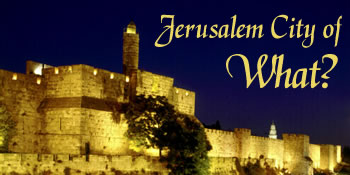
G-D
Even an arch rationalist like the premier legalist-philosopher Maimonides defines the sanctity of Jerusalem as emanating from the sanctity of the Divine presence, viewing the City - and the Temple Mount which is its apex - as the central home of the Divine. Hence for Maimonides the sanctity of Jerusalem is eternal, because despite military conquests by marauding nations, the Divine Presence can never be banished or destroyed (Hilkhot bet Habehirah, Chapter 6).
Memory
The Bible records that Terah, father of Abraham, took his family, left Ur of the Caldees, and set out on the long journey to Jerusalem, capital of the land of Canaan. He never reached his destination, but only managed to get to Haran, where he died. The Almighty then commanded his son, the first Jew, to continue on the path initiated by his father, to leave his present land, birthplace and father's home, and to live in - and take possession of - Jerusalem, Canaan, Israel (Genesis 11:31, 32; 12:1-3). Apparently, the only city in the ancient world that still remembered the Divine creation of the world, the Divine formation of the human being in His image, and the Divine command that "he who sheds blood shall have his blood shed by others," was Jerusalem in the land of Canaan; and so Terah wanted to bring his family there, and G-d wanted Abraham and his descendants to live there.
Recognition On of The Miraculous
for miracles reside, after all, in the eyes of the beholder. After Abraham emerges victorious from a battle waged in order to rescue his nephew Lot, who had been taken captive by the four evil nations that were terrorizing the entire Fertile Crescent, he is greeted by his ally the King of Sodom as well as by Malki Zedek (King of Righteousness), the King of Jerusalem. The former is only interested in his share of the spoils of victory: "Give me the captured soldiers, you take the booty." The latter, however, sees the miraculous hand of G-d in helping Abraham secure victory over tyranny, supplant might with right: "Blessed be Abraham to the G-d on High, Acquirer of heaven and earth; and blessed be the G-d on High who has delivered your enemies into your hand."
Commitment
the place where the first Jew was willing to sacrifice his beloved son - his entire future - to the will of the Lord of the world who demands justice and righteousness (Genesis 14:14-24).
Life
for the ultimate message of the Akedah (sacrifice) is the Divine desire for us to live by His words and not to die by them (Genesis 22:1-19). Indeed, Isaac the son is forever after called the whole burnt offering, because his entire life - spent in Israel - is dedicated to the ideals of his G-d and the forging of his nation.
Jewish National Sovereignty
where King David, shepherd-psalmist-warrior of Ancient Israel, forged a united nation out of twelve fractious tribes. David established Jerusalem as the permanent seat of the Jewish commonwealth, and - equally primary in importance - as the ultimate home of the Temple of the Divine. Hence Jerusalem became the object of Jewish prayers and dreams, especially during the close to 2000 years of Jewish exile and persecution: we conclude every Yom Kippur fast and Passover Seder feast with the entreaty of "Next Year in Jerusalem", and we pledge on every happy occasion: "If I forget thee, O Jerusalem, may my right hand forget her cunning."
Peace
the culmination of history, the vision of our faith. Our G-d is, after all, the Lord of the world, and so His Temple must be "called a House of Prayer for all nations." It is from Jerusalem that our prophets envision a Temple beckoning to all peoples to turn their backs on "evil-doing and destruction ... so that the Knowledge of the Lord will fill the world as the waters cover the seas."
Messiah
the bridge between the many worlds of warring nations and the one world under G-d. Israel is the guardian nation entrusted with the delicate but exalted task of teaching the ethical monotheism of the one G-d Who - at the same time - permits "each nation to walk, each person in the name of his G-d, and we to walk in the name of the Lord our G-d forever (Micah 4:5)." It is this vision which inspired us - in stark contrast to every conquering nation before us - to have insisted on the sanctity of all the religious shrines and on the right of all religions to pray in their holy places, when we liberated Jerusalem in 1967.
Our Furure
The future of Jerusalem remains the greatest challenge to the nations of the world as well as to us, the House of Israel.
Rabbi Shlomo Riskin is the founder and Chancellor of Ohr Torah Stone Institutions of Israel, and is also the Chief Rabbi of Efrat, Israel. He is the founding rabbi of Lincoln Square Synagogue in Manhattan.

